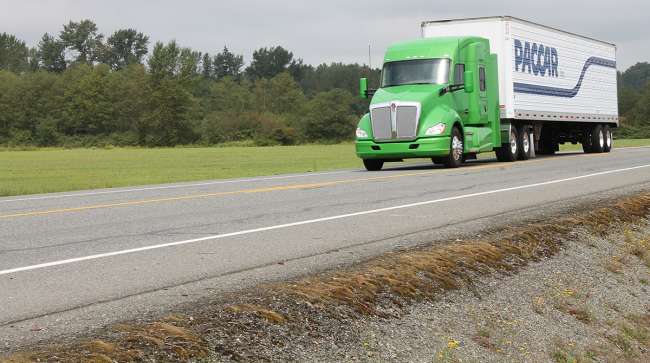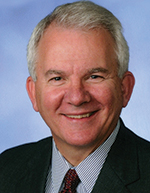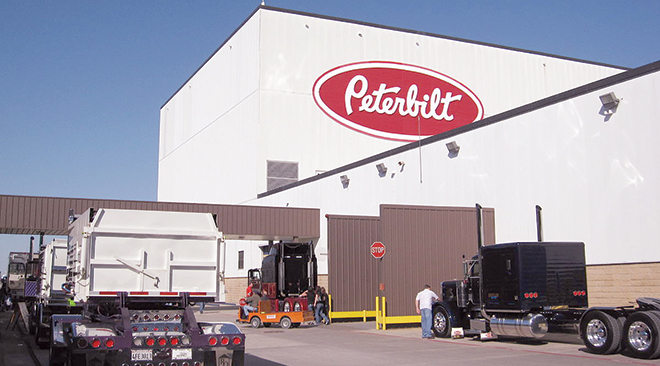Senior Reporter
Paccar Reports Record Revenue in 4Q, Full Year

Truck maker Paccar Inc. reported record sales and improved net income for the 2017 fourth quarter and full year, benefiting from peak North American market share and strong aftermarket parts sales.
“Paccar’s financial results reflect the company’s premium-quality products and services, record heavy-duty truck market share in the U.S. and Canada, record aftermarket parts results and a strong European truck market,” Paccar CEO Ron Armstrong said in a statement.

Armstrong
Paccar is the parent company of North American brands Kenworth Truck Co. and Peterbilt Motors Co. as well European brand DAF.
“Our teams work very hard to develop market share. When I started with the company 24 years ago, Peterbilt and Kenworth had a combined share of 21%. Over the 24 years they have been able to increment that to 25%, 28% and now over 30%. Our view is to continue to develop the best trucks in the market, provide the best value for our customers and organically grow our share profitably in our primary markets. So that will be our focus for 2018, as well,” Armstrong said Jan. 30 during a conference call with financial analysts.
Quarterly net income for the period ended Dec. 31 was $589.2 million, or $1.67 per diluted share. This included $173.4 million of net tax benefits resulting from the Tax Cuts and Jobs Act of 2017, which lowered corporate tax rates.
Excluding the tax benefits, net income was $415.8 million, or $1.18. That compares with $288.8 million, or 82 cents in the fourth quarter of 2016.
Revenue in the quarter jumped 34% to $5.45 billion, a record, compared with $4.07 billion for the same period in 2016.
For all of 2017, total net income reached $1.68 billion, or $4.75, including the one-time tax benefit. Excluding the benefit, net income was $1.50 billion, or $4.26.
In 2016, the company reported annual net income of $521.7 million, or $1.48, including an $833 million nonrecurring charge for a European Commission settlement. Excluding the charge, 2016 net income was $1.35 billion, or $3.85.
Full-year revenue last year rose 14% to a record $19.46 billion, compared with $17 billion in the year-earlier period.
“The enacted tax legislation will generate positive cash flow for Paccar as well as benefit the transportation industry in the United States,” Paccar Chief Financial Officer Harrie Schippers said in a statement. “The revised corporate tax rate, comparable to other leading OECD [Organisation for Economic Co-operation and Development] countries’ tax rates, and accelerated machinery and equipment depreciation, will likely stimulate increased capital investment in the United States.” The United States is one of 35 nations in OECD.
Paccar estimates that its 2018 effective global tax rate will be 23% to 25% compared with about 31% prior to the new tax law.

Peterbilt plant by Mahanga/Wikicommons
Kenworth and Peterbilt in 2017 combined for a company-record Class 8 retail market share of 30.7% in the United States and Canada. That compares with 28.5% in 2016. Paccar delivered 158,900 vehicles worldwide, which included a record 29,700 medium-duty trucks.
Class 8 retail sales in the U.S. and Canada were 218,000 units in 2017, up from 216,000 in 2016. Paccar forecasts an increase in U.S. and Canada Class 8 retail sales to between 235,000 to 265,000 trucks this year.
Paccar also estimates European heavy-duty truck sales in the above 16-tonne market in 2018 will range from 290,000 to 320,000 trucks. That compares with 306,000 in 2017.
Turning to parts, its aftermarket segment saw record fourth-quarter pre-tax income of $157.2 million, 14% higher than the $137.5 million earned in the fourth quarter of 2016.
Fourth-quarter 2017 aftermarket revenues were a record $877.2 million, compared with $765 million reported in the fourth quarter of 2016.
Pre-tax profit from parts for the full year rose to $614 million compared with $544 million a year earlier.
Annual aftermarket revenues were $3.33 billion, up 11% from $3.01 billion in 2016.
Paccar pointed to investments in distribution and technology, initiatives such as its TRP all-makes parts stores and a growing population of Kenworth, Peterbilt and DAF trucks powered by Paccar engines as driving its aftermarket segment.
Also, the company is ramping up research and development to between $280 million and $310 million from $264.7 million in 2017. It is focusing on long-term growth in new truck models, integrated powertrains including zero emission electrification and hydrogen fuel cell technologies, enhanced aerodynamic truck designs, advanced driver assistance systems and truck connectivity and expanded manufacturing and parts distribution facilities.

